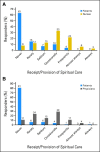Why is spiritual care infrequent at the end of life? Spiritual care perceptions among patients, nurses, and physicians and the role of training
- PMID: 23248245
- PMCID: PMC4878036
- DOI: 10.1200/JCO.2012.44.6443
Why is spiritual care infrequent at the end of life? Spiritual care perceptions among patients, nurses, and physicians and the role of training
Abstract
Purpose: To determine factors contributing to the infrequent provision of spiritual care (SC) by nurses and physicians caring for patients at the end of life (EOL).
Patients and methods: This is a survey-based, multisite study conducted from March 2006 through January 2009. All eligible patients with advanced cancer receiving palliative radiation therapy and oncology physician and nurses at four Boston academic centers were approached for study participation; 75 patients (response rate = 73%) and 339 nurses and physicians (response rate = 63%) participated. The survey assessed practical and operational dimensions of SC, including eight SC examples. Outcomes assessed five factors hypothesized to contribute to SC infrequency.
Results: Most patients with advanced cancer had never received any form of spiritual care from their oncology nurses or physicians (87% and 94%, respectively; P for difference = .043). Majorities of patients indicated that SC is an important component of cancer care from nurses and physicians (86% and 87%, respectively; P = .1). Most nurses and physicians thought that SC should at least occasionally be provided (87% and 80%, respectively; P = .16). Majorities of patients, nurses, and physicians endorsed the appropriateness of eight examples of SC (averages, 78%, 93%, and 87%, respectively; P = .01). In adjusted analyses, the strongest predictor of SC provision by nurses and physicians was reception of SC training (odds ratio [OR] = 11.20, 95% CI, 1.24 to 101; and OR = 7.22, 95% CI, 1.91 to 27.30, respectively). Most nurses and physicians had not received SC training (88% and 86%, respectively; P = .83).
Conclusion: Patients, nurses, and physicians view SC as an important, appropriate, and beneficial component of EOL care. SC infrequency may be primarily due to lack of training, suggesting that SC training is critical to meeting national EOL care guidelines.
Conflict of interest statement
Authors' disclosures of potential conflicts of interest and author contributions are found at the end of this article.
Figures

References
-
- Steinhauser KE, Christakis NA, Clipp EC, et al. Factors considered important at the end of life by patients, family, physicians, and other care providers. JAMA . 2000;284:2476–2482. - PubMed
-
- Alcorn SR, Balboni MJ, Prigerson HG, et al. “If God wanted me yesterday, I wouldn't be here today”: Religious and spiritual themes in patients' experiences of advanced cancer. J Palliat Med . 2010;13:581–588. - PubMed
-
- Brady MJ, Peterman AH, Fitchett G, et al. A case for including spirituality in quality of life measurement in oncology. Psychooncology. 1999;8:417–428. - PubMed
-
- McClain CS, Rosenfeld B, Breitbart W. Effect of spiritual well-being on end-of-life despair in terminally-ill cancer patients. Lancet . 2003;361:1603–1607. - PubMed
Publication types
MeSH terms
Grants and funding
LinkOut - more resources
Full Text Sources
Other Literature Sources

